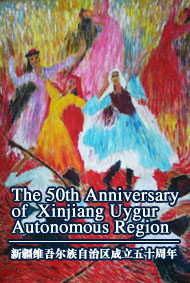| |
Blessings and Wisdom
( 2005-09-13 )
 Blessings and Wisdom (Kutadgu Bilig)is a classic Uygur literary masterpiece on the philosophy of life and how to administer a country written by the famous poet Yusuf Khass Hajib (1018-1080) in the 11th century, or more precisely from 1069 to 1070. It contains 85 chapters in 13,290 lines. The epic is also known as the Wisdom of Royal Glory. Today there are three known copies. Blessings and Wisdom (Kutadgu Bilig)is a classic Uygur literary masterpiece on the philosophy of life and how to administer a country written by the famous poet Yusuf Khass Hajib (1018-1080) in the 11th century, or more precisely from 1069 to 1070. It contains 85 chapters in 13,290 lines. The epic is also known as the Wisdom of Royal Glory. Today there are three known copies.
1. The copy in Vienna: (in Huihu alphabet, the ancient Uygur language) was found in 1439 and donated to the National Library of Vienna.
2. The copy in Cairo: (in Arabic alphabet) was found in Cairo in 1896.
3. The copy in Nemengah: (in Arabic alphabet) was found in Nemengah, Uzbekistan.
The epic is based on four abstract principles, each of which is represented by one of the four major characters: Rising Sun (King, representing the concept of Justice), Full Moon (vizier, representing Fortune), Highly Praised (sage, representing Intellect or Wisdom), and Wide Awake (ascetic, representing Man's Last End). These are also the four basic concepts inBlessings and Wisdom.
Each concept is represented by a person and opinions on such issues as the State, politics, society, professions and ethics are expressed during dialogues among these people.
Blessings and Wisdomincludes numerous concepts besides the four basic concepts mentioned above, such as Biliglik (wisdom), Kutluluk (happiness), Konilik (rightness, justice), Erdem (virtue), Edgu (kindness, doing favors), Asiglig (helpfulness), love, loyalty, generosity, bravery, patience and modesty are classified as ethically positive concepts, whereas lying, hastiness, ignorance, meanness and greed are listed as negative ethical concepts.
Blessings and Wisdomof Yusuf Khass Hajib is the first great literature masterpiece written in the Huihu alphabet, the ancient Uygur language. The work, more or less affected by Arabian and Persian literature, began in ancient rhythms and in the style of Uygur poetry. The epic, with profound ideology, elegant sentence forms, precise rhythms, and adept artistic style, is the first literature monument in the history of the ancient Uygur culture.
Yusuf Khass Hajib was born in 1082, and died inKashgarin 1091. He composed the epic ofBlessings and Wisdomin present-day Kashi.
Not the plot or form of the book but the content of dialogues determine the importance ofBlessings and Wisdom.
After the founding of New China, the government and related departments, placed importance on the preservation and research onBlessings and Wisdom, producing in succession segments of a Chinese version in 1979, and the complete work in the modern Uygur language in May 1984 and the complete Chinese version in October 1986. The beginning of 1989 witnessed the establishment of the Research Academy ofBlessings and Wisdomin Kashi, the birthplace of the epic.
|
|

